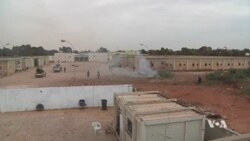LONDON —
Witnesses say warplanes launched at least two missile strikes on Jihadist bases Thursday near the eastern city of Benghazi.
The strikes are latest in a series of assaults led by rogue Libyan army general Khalifa Hiftar, whose so-called National Libyan Army has been fighting militants in the region for months.
Forces loyal to the former general carried out two airstrikes on the February 17 Martyrs Brigade compound west of Benghazi on Wednesday. No casualties were reported, but witnesses say there was structural damage to the facilities housing the brigade, which is made up of former Islamist ex-rebels and one of the largest militant groups in Benghazi.
In a statement last week, Hiftar claimed he was leading Libya's army to restore stability of the nation's political life and security three years after the ouster and death of Moammar Gadhafi.
But according to Libya analyst Jason Pack of Cambridge University, who is president of libya-analysis.com, Hiftar does not lead any national army.
"What Khalifa Hiftar calls a national army is yet another militia which he has branded or named the national army," Pack said.
But Hiftar has succeeded, Pack said, in reaching out to an anti-Islamist segment of the Libyan population, and the support is growing. In recent days street demonstrations have broken out in Tripoli and Benghazi in support of General Hiftar.
"This stand is for the country, for saving what is left of the country's dignity, and also supporting the army and police so they can eliminate criminals and outlaws," Sheikh Mohamed Lamin, who was among the supporters, said.
Earlier this month, forces loyal to Hiftar carried out a rocket attack on Libya's Islamist-dominated parliament, which Hiftar accuses of supporting Jihadist militias.
Western officials have voiced fears the violence could degenerate into civil war as rival factions fight for power.
Pack says several pro- and anti-Islamist, tribal and regional factions are currently vying for national influence.
"There was more unity when their goal was to overthrow Gadhafi," he said. "The further that has receded into memory, the different factions have begun expressing their own agendas."
Hiftar, who served under Gadhafi before defecting to the United States in the 1980s, has denied widespread claims he was trained by the CIA.
"Libyans remember both his CIA connections and his Gadhafi connections, and when he tried to insert himself into the rebel leadership in 2011 when the uprising began, he was never taken seriously," said Pack. "He is a man who wants to hold power so much that he is playing whatever circumstance exists to his benefit."
A new cabinet was sworn in this week, despite an opposition boycott and legal challenges. New Prime Minister Ahmed Maiteeg vowed to prevent Libya from fragmenting, saying new ministers would strive in every way to fight terrorism, and fight to build the institutions of the police and army.
The United States has urged all its citizens to leave Libya immediately. In a speech Wednesday, President Barack Obama pledged to help the country build a functioning security force and border patrol.
The strikes are latest in a series of assaults led by rogue Libyan army general Khalifa Hiftar, whose so-called National Libyan Army has been fighting militants in the region for months.
Forces loyal to the former general carried out two airstrikes on the February 17 Martyrs Brigade compound west of Benghazi on Wednesday. No casualties were reported, but witnesses say there was structural damage to the facilities housing the brigade, which is made up of former Islamist ex-rebels and one of the largest militant groups in Benghazi.
In a statement last week, Hiftar claimed he was leading Libya's army to restore stability of the nation's political life and security three years after the ouster and death of Moammar Gadhafi.
But according to Libya analyst Jason Pack of Cambridge University, who is president of libya-analysis.com, Hiftar does not lead any national army.
"What Khalifa Hiftar calls a national army is yet another militia which he has branded or named the national army," Pack said.
But Hiftar has succeeded, Pack said, in reaching out to an anti-Islamist segment of the Libyan population, and the support is growing. In recent days street demonstrations have broken out in Tripoli and Benghazi in support of General Hiftar.
"This stand is for the country, for saving what is left of the country's dignity, and also supporting the army and police so they can eliminate criminals and outlaws," Sheikh Mohamed Lamin, who was among the supporters, said.
Earlier this month, forces loyal to Hiftar carried out a rocket attack on Libya's Islamist-dominated parliament, which Hiftar accuses of supporting Jihadist militias.
Western officials have voiced fears the violence could degenerate into civil war as rival factions fight for power.
Pack says several pro- and anti-Islamist, tribal and regional factions are currently vying for national influence.
"There was more unity when their goal was to overthrow Gadhafi," he said. "The further that has receded into memory, the different factions have begun expressing their own agendas."
Hiftar, who served under Gadhafi before defecting to the United States in the 1980s, has denied widespread claims he was trained by the CIA.
"Libyans remember both his CIA connections and his Gadhafi connections, and when he tried to insert himself into the rebel leadership in 2011 when the uprising began, he was never taken seriously," said Pack. "He is a man who wants to hold power so much that he is playing whatever circumstance exists to his benefit."
A new cabinet was sworn in this week, despite an opposition boycott and legal challenges. New Prime Minister Ahmed Maiteeg vowed to prevent Libya from fragmenting, saying new ministers would strive in every way to fight terrorism, and fight to build the institutions of the police and army.
The United States has urged all its citizens to leave Libya immediately. In a speech Wednesday, President Barack Obama pledged to help the country build a functioning security force and border patrol.





